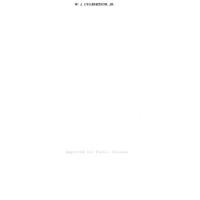Investigation and Design of a Regenerable Silver Oxide System for Carbon Dioxide Control
Item
-
Title
-
Investigation and Design of a Regenerable Silver Oxide System for Carbon Dioxide Control
-
Date
-
1964
-
Index Abstract
-
Not Available
-
Photo Quality
-
Not Needed
-
Report Number
-
AMRL TR 64-119
-
Creator
-
Culbertson, W. J.
-
Corporate Author
-
Denver Research Institute
-
Laboratory
-
Biomedical Laboratory
-
Extent
-
112
-
Identifier
-
AD0612021
-
Access Rights
-
CFSTI
-
Distribution Classification
-
1
-
Contract
-
AF 33(657)-10928
-
DoD Project
-
6373
-
DoD Task
-
637302
-
DTIC Record Exists
-
Yes
-
Distribution Change Authority Correspondence
-
None
-
Distribution Conflict
-
No
-
Abstract
-
Precipitated silver carbonate was investigated using test tube samples to establish the merits of this approach to an Ag2O solids system for CO2 removal. Moisture catalyzes transport of CO2 or Ag(+) through an Ag2CO3 layer protecting the Ag2O from conversion to Ag2CO3. Regeneration to Ag2O may be accomplished in moist partial vacuum at 125C within 2 hours. H2O must reach the decomposing Ag2CO3 by penetrating a protective Ag2O layer counterflow to the outflowing CO2. Moisture is not necessary with Y(+++) catalyst at 150C. absorption is speeded 2-3 fold with Y(+++) catalyst. At 1/2% CO2 and 50% humidity 75% yield is attained within 16 hours. Y(+++) dissolved in the cation lattice is believed to induce Ag(+) vacancies in Ag2CO3 and increase Ag(+) transport through the Ag2CO3 layer. H2O may catalyze by supplying OH(-) which dissolves in the anion lattice inducing Ag(+) vacancies. Preliminary work on several other metal oxides showed Zn and Pb to be most promising of these as a substitute for the short-lived Ag2O.
-
Report Availability
-
Full text available
-
Date Issued
-
1964-12
-
Provenance
-
RAF Centre of Aviation Medicine
-
Type
-
report
-
Format
-
1 online resource
 AMRLTR64-119.pdf
AMRLTR64-119.pdf